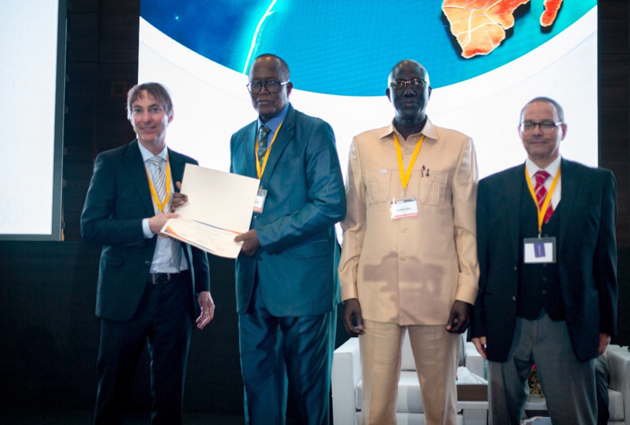A Collaborative Effort: How an ISN Sister Renal Centers Partnership Transformed Peritoneal Dialysis Care in Sri Lanka

Dr. Shuchi Anand (center right, back row) with kidney care professionals at Kandy Teaching Hospital in Sri Lanka
An ISN Sister Renal Centers partnership between Kandy Teaching Hospital (KTH) in Sri Lanka and Stanford University (affiliated with Santa Clara Valley Medical Center) has brought about a substantial transformation in the kidney care landscape in the country, elevating continuous ambulatory peritoneal dialysis (CAPD) care delivery, training, and patient education across the nation.
Dr. Anjali Saxena, who supervises one of the largest CAPD units in the United States, Dr. Shushi Anand, and other faculty at Stanford worked alongside staff at the KTH to improve peritonitis rates and reduce hospitalizations.
The partnership’s main goal was to develop a peritoneal dialysis (PD) program at the KTH for the local city population and for those living in rural areas devastated by chronic kidney disease of unknown origin (CKDu). CKDu is a significant issue in Sri Lanka, where 10 out of 25 districts have been identified as areas with a high prevalence of CKDu (10–20%)1. Girandurukotte, close to the KTH, is one of the “dry zone” epicenters of CKDu.
Regional challenges
According to ISN SRC liaison officer for the emerging center, Dr. Nishantha Nanayakkara, who had launched a PD program in the region prior to the SRC partnership with help from ISN South Asia Regional Board member Dr. Abdul Wazil, nephrologists and patients were skeptical about PD as an effective treatment. He commented, “Many perceived that PD was an inferior therapy offered to poor people. We realized that in order to grow PD sustainably, there would need to be substantial investment in quality.”

Dr. Shuchi Anand (center right) with fellow kidney health professionals at KTH on World Kidney Day
Educational initiatives
One of the first initiatives of the SRC partnership was the launch of a curriculum –”The Stanford Ambulatory Peritoneal Dialysis Training” – designed for nurses and medical officers to improve their knowledge and practice of CAPD. The course features on the ISN Academy and has received the highest audience engagement for two years. This initiative has also led to two peer-reviewed publications.
Innovative models of care
Dr. Anand visited the KTH in 2023 to help implement another key accomplishment of the partnership – transforming the PD unit from a traditional “doctor-led” clinic to a nurse-centered model of CAPD care. Initially, nurses would only spend a few months working in the CAPD unit before being rotated to other parts of the hospital. With support from Dr. Anand and Dr. Saxena, Dr. Nanayakkara successfully appealed to the Ministry of Health to secure a steady assignment of dedicated nurses to stay longer in the CAPD unit. Once a dedicated group of nurses was established, two nurses who scored the highest on a curriculum test were sent to Stanford University to follow a “Hands-on Training for Trainers” course.
These nurses and Drs. Saxena and Nanayakkara organized a CAPD day in collaboration with the Sri Lankan Society of Nephrology and hosted a CAPD workshop in Colombo, in Western Sri Lanka. This event marked the beginning of significant growth in the uptake of CAPD in Sri Lanka, with many nephrologists adopting the practice, some of whom were trained in percutaneous PD catheter placement.

KTH nurses at a CAPD workshop in Colombo
The KTH CAPD nurses now lead efforts to track CAPD quality metrics and present their findings quarterly to lead hospital administrators, medical officers, nephrology registrars and consultants, and microbiologists. Dr. Nanayakkara commented, “This is a milestone achievement for CAPD sustainability and quality.”
Facing challenges
During the pandemic, the team transitioned to remote, case-based webinars for training. Additionally, Dr. Nanayakkara collaborated with a creative director to produce educational videos in the local language to address patient concerns and dispel myths about PD.
Watch the videos here
According to Dr. Shuchi Anand, Sri Lanka’s financial crisis has led to unexpected issues, including shortages of antibiotics and PD funding and a lack of doctors due to emigration. In response, Stanford Hospital temporarily raised $10,000 to cover the cost of CAPD fluids, and Dr. Nanayakkara established telehealth clinics to serve rural areas.
Following an additional visit from Dr. Anand to the KTH, the need for periodic assessments to pinpoint emerging problems was reinforced. During this visit, nurses and medical officers partnered with microbiologists to identify and address a high rate of fungal peritonitis at the KTH.
Expanding impact
Despite these challenges, the ISN Sister Renal Centers partnership has facilitated the growth of a thriving CAPD program, expanding its services from approximately 50 patients to around 200 patients. The KTH now serves as a center of reference in the country. New PD programs are rapidly being developed by kidney care professionals who either undertook fellowships at the KTH fellowships or received CME training from Stanford.
Future directions
Although the centers have graduated from the program, the collaboration is ongoing. Dr. Anand plans to conduct a low-cost clinical trial to address peritonitis with assistance from ISN-Advancing Clinical Trials experts, local Sri Lankan public health experts, microbiologists, nephrologists and registered nurses. Dr. Anand will receive research funding for this project from the National Institutes of Health and the Stanford Woods Institute for the Environment. Dr. Meera Sankar, a senior nephrology registrar at Stanford, will shortly visit the KTH to train staff in clinical and research training. She is planning a clinical trial on patient PD education to be implemented at multiple centers in Sri Lanka.
In addition, the KTH plans to support a newly formed nephrology unit in Jaffna, one of the country’s war-torn regions.











